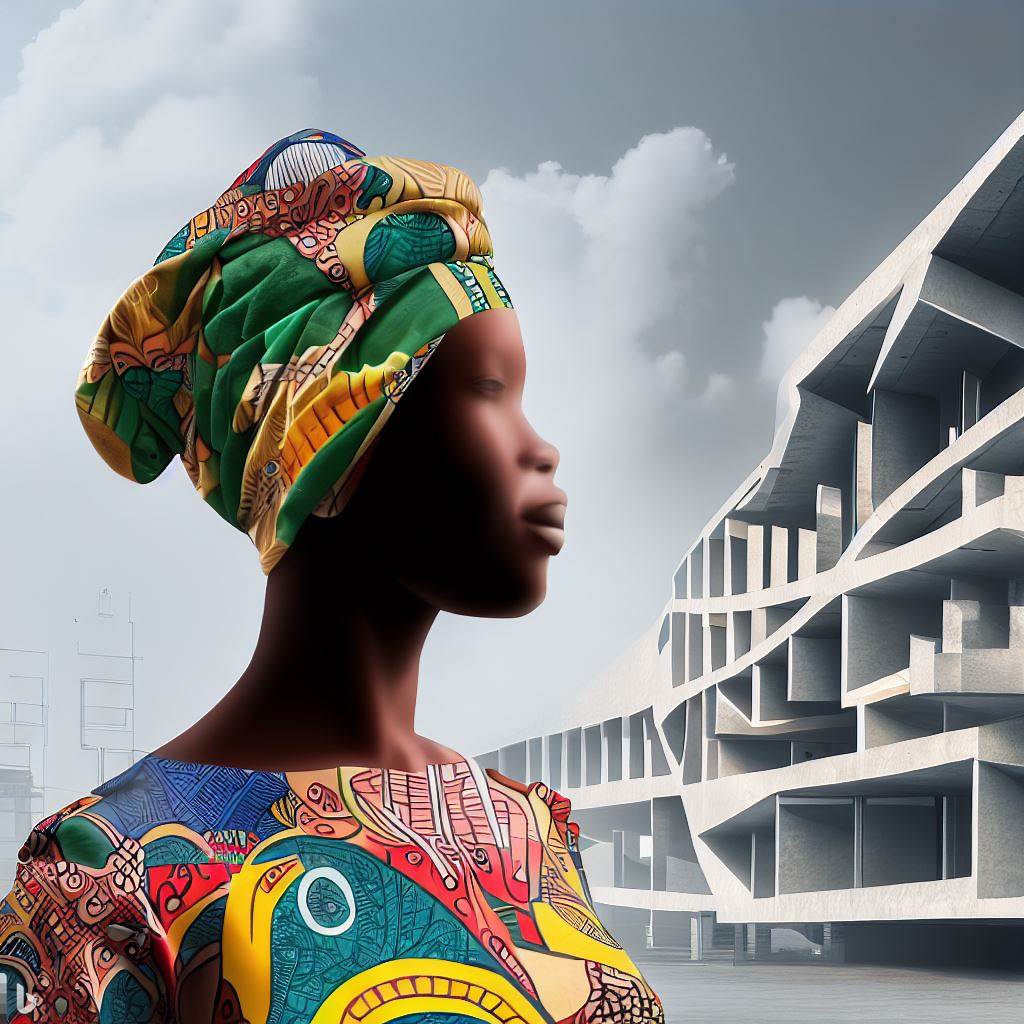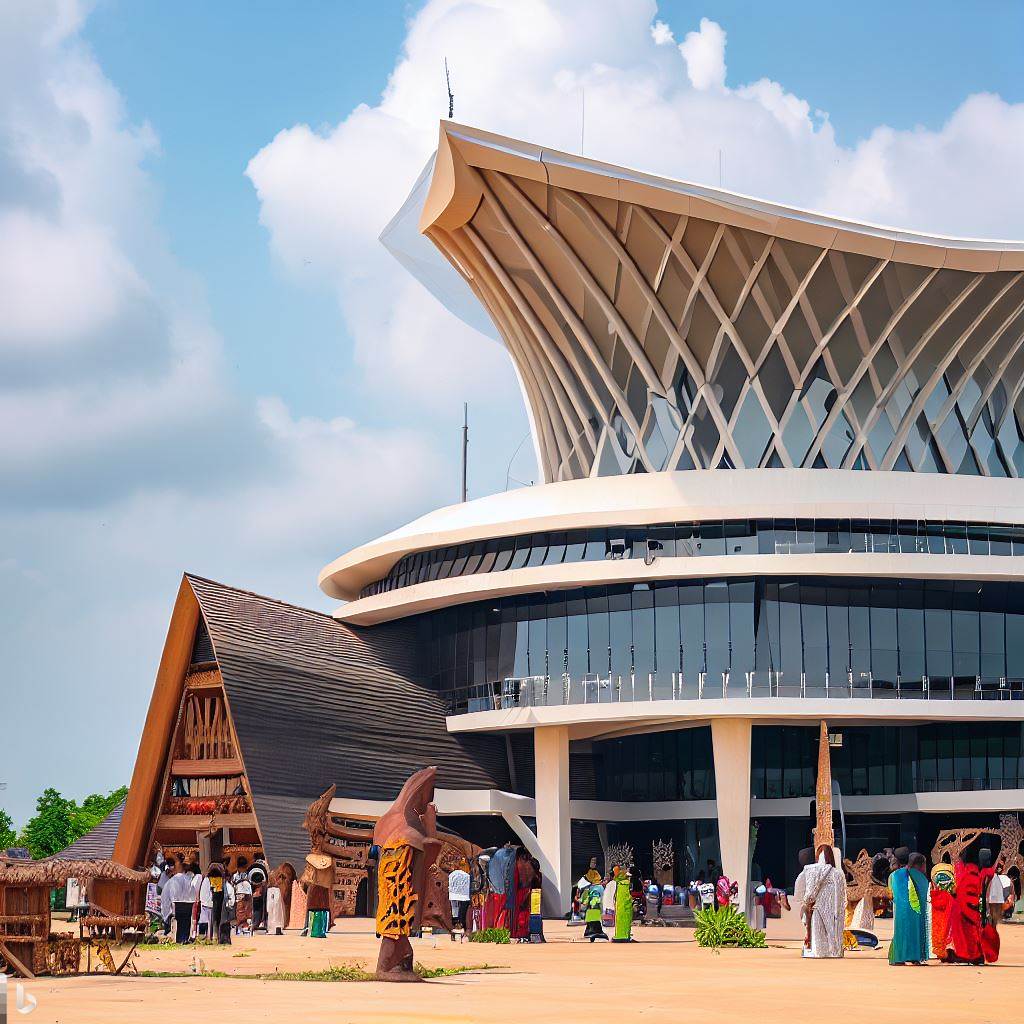Introduction
Nigeria’s architecture scene is thriving, with many talented professionals contributing to the industry. In a society where women have historically been marginalized, it is important to acknowledge their contribution to this field.
Women in Nigeria play an essential role in shaping the country’s architectural landscape.
Before we delve into the role of women in Nigeria’s architecture scene, let us first understand the general architecture landscape in Nigeria.
Nigeria has a unique blend of traditional and modern architecture. From the towering skyscrapers in Lagos to the mud houses in the northern region, every region has its unique architectural style.
Now let’s talk about the role of women in Nigeria. Historically, women were expected to play a domestic role and were not encouraged to venture into public life.
However, with changing times, the voices of women have become more prominent in many fields. Now many Nigerian women have overcome societal barriers to become professionals in diverse fields, including architecture.
The presence of women in Nigeria’s architecture scene is essential as it brings diverse perspectives to the table.
Women’s contribution to architecture reflects their unique experiences and outlook. Women architects are vital in designing spaces that are functional, aesthetically pleasing, and inclusive.
It is crucial to celebrate the contributions of women in Nigeria’s architecture industry. Moreover, it is essential to encourage more women to pursue careers in architecture. By promoting diversity in this field, we can create a more inclusive society.
Read: Impact of Nigerian Architecture on Africa’s Skyline
Historical Context of Women in Nigeria’s Architecture Scene
Understanding the historical context of women in Nigeria’s architecture scene is essential in appreciating their current and future contributions.
Traditional gender roles in Nigeria have relegated women to family and domestic responsibilities, and it was no different in the field of architecture.
Architects were considered a male-dominated profession, making it almost impossible for women to gain entry.
However, several female pioneers in architecture emerged in the early years, breaking the glass ceiling and inspiring other women to join the profession.
Some of these early pioneers include Fumihoe Akinsola, the first African female architect, who graduated in 1963 from the University of Lagos, and Olajumoke Adenowo, founder of one of Nigeria’s leading architecture firms.
Despite these early successes, women architects in Nigeria face significant challenges in the industry. Patriarchal and societal norms that stereotype women as less capable or suited for technical and professional work have limited their opportunities.
Women struggle with bias, discrimination, and exclusions from professional networks, and gender wage disparities persist across the industry.
In addition to societal barriers, other challenges that women architects face include lack of access to affordable childcare, maternity leave, and flexible work arrangements.
The gender disparity in architectural practice is also reflected in the low representation of women in leadership and board positions in professional associations and organizations.
Despite these challenges, women in Nigeria’s architecture scene continue to make significant contributions in the sector.
Nigerian women architects have shown resilience and determination to excel in a male-dominated profession.
The achievements of notable female architects in the country have brought wider recognition for women in the industry.
More women enter the field and take up leadership roles,
there has been a gradual shift in attitude towards them, with more Nigerians acknowledging the critical role that women play in architecture.
The empowerment of women in the architecture scene will not only promote gender equality but will also bring diverse perspectives and unique contributions to the industry.
The success story of women in Nigeria’s architecture scene also has the potential to inspire younger generations to consider the profession as a viable career path.
Through mentorship, scholarships, and other forms of support, women architects can serve as role models for aspiring female architects, encouraging them to persevere and pursue their dreams.
In essence, the historical context of women in Nigeria’s architecture scene highlights the progress made towards gender equality in the industry.
Despite the challenges that women architects face in Nigeria, they continue to make significant contributions and have the potential to grow further.
Encouraging women’s education, entry, and promotion in architecture can help advance the profession, promote gender equality, and transform the built environment for the better.
Read: Challenges Faced by Nigerian Architects: A Deep Dive
Current State of Women in Nigeria’s Architecture Scene
Despite strides in gender equality, women remain underrepresented in Nigeria’s architecture scene. Nevertheless, women architects continue to break new ground and achieve great success in the field.
Representation in Architectural Firms
Women architects account for a minority of the total number of architects in Nigeria. According to the Nigerian Institute of Architects, only 25% of registered architects in Nigeria are women.
This underscores the need for more female representation in the industry, especially in leadership positions.
However, it is encouraging to note that there is a growing number of women pursuing careers in architecture.
Young women are increasingly choosing architecture as a career path due to a growing awareness of the field’s potential and the rising number of talented female architects.
Leadership Positions Held by Women
Women in Nigeria’s architecture scene have become increasingly visible in leadership positions. More and more women are taking up key leadership roles in firms, universities, and professional organizations.
This is an indication of the growing influence and impact that women architects have on the field.
Female architects have led numerous high-profile projects across Nigeria, including residential and commercial buildings, healthcare facilities, and public infrastructure.
Women architects are also occupying roles as project managers, senior architects, and principal architects, among others.
Contributions to the Development of the Field
Women architects in Nigeria have made significant contributions to the development of the field.
Their innovative designs and architectural concepts have not only enriched the country’s built environment but also elevated the status of architecture as a profession in Nigeria.
One area where women architects have made a significant impact is in sustainable architecture. Female architects in Nigeria have played a major role in designing eco-friendly buildings and promoting green architecture in the country.
There is a growing interest in sustainable architecture, and women architects have been at the forefront of advocating for environmentally responsible design practices.
In addition, women architects in Nigeria have been active in mentoring the next generation of architects.
Many have taken on teaching roles in universities and design schools, passing on their knowledge and experience to young architects.
Women architects have also been instrumental in encouraging young girls to pursue careers in architecture and other STEM fields.
The role of women in Nigeria’s thriving architecture scene is becoming increasingly important. Women architects are making significant strides, breaking barriers, and occupying leadership roles in firms, universities, and professional organizations.
Although there is still much more work to be done to achieve gender equality, the progress made is promising and should be celebrated. The contributions of women architects to the development of the field cannot be understated.
Read: Exploring the Evolution of the Architecture Profession in Nigeria

Find Out More: Impact of Nigerian Architecture on Africa’s Skyline
Women-led Architecture Firms in Nigeria
Women are making a significant impact in Nigeria’s architecture scene, despite the challenges they face. Here are some success stories of women-led firms:
- Architect Bolatito Fadase is the founder and CEO of Studio Fadase, an architecture firm that focuses on sustainable and eco-friendly designs. Her firm has worked on projects such as the Lagos State Emergency Management Agency (LASEMA) headquarters, which won the prestigious International Property Awards (IPA) for Best Public Service Architecture in Africa.
- Architect Tosin Oshinowo is the founder of cmDesign Atelier, which specializes in residential, commercial, and institutional architecture. Her firm has designed the Nike Art Gallery in Lagos, a space that showcases Nigerian art, and the Maryland Mall in Lagos, which won the 2016 City People Awards for Best Shopping Mall in Lagos.
- Architect Sarah S. Takyi is the CEO of Buildafrique Consulting Group, a firm that provides building design, construction, and project management services. Her firm has worked on the design and construction of The Hilltop Clubhouse and The Highbury Park Estate in Abuja.
These women-led firms are not only making waves in the industry;
they’re also making a significant impact on society. Here are some ways in which their work is positively affecting the industry and society at large:
- Representation: Women-led firms are increasing the visibility of women in architecture, showcasing their skills and expertise.
- Diversity: The work of women-led firms brings diversity to the industry, resulting in unique and innovative designs.
- Empowerment: By leading firms, these women are empowering other women to pursue careers in architecture and related fields.
- Social Impact: Women-led firms are working on projects that have a positive impact on society, ranging from eco-friendly designs to the creation of community spaces.
While women-led architecture firms face unique challenges, there are many lessons to be learned from their experiences. Here are a few:
- Networking is key: Building a network of contacts and mentors is crucial for success in the industry.
- Confidence is essential: Women must believe in their abilities and expertise to succeed as leaders in the industry.
- Mentorship is important: Women who have succeeded in the industry must offer mentorship and support to the next generation of architects.
- Collaboration is valuable: Women-led firms can benefit from collaborating with other firms and organizations, both locally and internationally.
In summary, women-led architecture firms are making a significant impact on Nigeria’s architecture scene, bringing diversity, innovation, and social impact to the industry.
Their success stories demonstrate the importance of networking, confidence, mentorship, and collaboration for women in the industry.
With their continued efforts, we can hope to see a more inclusive and empowering architecture scene in Nigeria and beyond.
Challenges and Opportunities for Women in Nigeria’s Architecture Scene
Despite the increasing number of women in Nigeria’s architecture scene, persistent barriers continue to hinder their progress.
- Women in architecture still face discrimination, bias, and lack of access to opportunities and resources.
- Gender stereotypes and cultural expectations also contribute to the underrepresentation of women in leadership positions.
- Motherhood and work-life balance are also major challenges for women in the industry.
However, there are initiatives aimed at supporting and empowering women in architecture. These include:
- The Association of Women Architects in Nigeria (AWAN), which advocates for gender equality and provides a platform for women in the field to connect and support each other.
- The Women in Architecture Nigeria (WIAN) program, which offers training, mentorship, and networking opportunities for female architects.
- The Nigerian Institute of Architects (NIA), which has a Women in Architecture Committee that promotes the participation of women in the institute’s activities.
These initiatives, along with increasing awareness and efforts towards gender diversity, provide opportunities for women to thrive in Nigeria’s architecture scene.
Read: Dissecting The Architect Registration Council of Nigeria
Moreover, women have the potential to drive innovation and change in the field, given their unique perspectives and experiences.
- Women often bring a different approach to design and problem-solving, which can lead to more diverse and creative solutions.
- With their empathetic and collaborative nature, women can also bring a new dimension to leadership and teamwork in architecture.
- By advocating for more inclusive and sustainable practices, women in architecture can contribute to building a better future for Nigeria and beyond.
In fact, while there are still challenges faced by women in Nigeria’s architecture scene, there are also opportunities for them to make significant contributions and thrive in the field.
By supporting and empowering women, and embracing their unique perspectives and strengths, the architecture industry can become more diverse, innovative, and inclusive.
Read: Working Conditions for Aviation Professionals in Nigeria
Conclusion
Recognizing and addressing gender inequality in architecture is crucial for the success and growth of the industry.
Women have made significant contributions to Nigeria’s thriving architecture scene, but they still face barriers and discrimination.
We must continue to support and advocate for women in the field, providing opportunities for education and professional development.
By valuing diverse perspectives and experiences, we can create better-designed buildings and cities that serve everyone.
As the world becomes more interconnected and diverse, the role of women in architecture will become even more important.
By breaking down barriers and promoting gender equality, we can create a more inclusive and innovative future for the industry.




